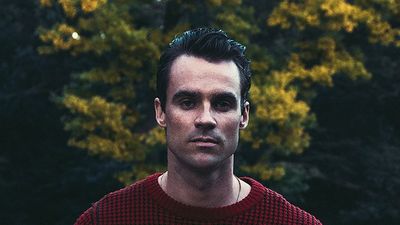First Look Friday: From Punk To Funk, Canadian Crooner Ben Stevenson Airs Out His 'Dirty Laundry'
Nowhere than in the music of newcomer Ben Stevenson--Canada's latest entry into the atmospheric r&b game--can you find a better pretty example of the ever more fluid connection between the flannel-clad punk scene to the melancholy left-field-ism of contemporary r&bibbity. Hailing from Canada's ever-widening pool of punk-rooted pioneers, Stevenson has gracefully transitioned to the more soulful side of things with his debut solo record Dirty Laundry (which was premiered right here earlier in the week);an impressive 7-track treasury of moody-musical seduction that's coated in just as much pain as it is in pleasure, helmed by Grammy-winning hit-maker Happy Perez. We recently caught up with the dulcet Canadian Crooner to rap about the new album, his transition from punk to funk and where he seems himself a little down the line. Peep the Q&A session below and head over to his Facebook page to grab a free copy of the album. Make note of the name Ben Stevenson, and take note as we continue the chart the ascent of one of Canada's most promising young vocalists.
OKP: Is Ben Stevenson your government name?
Ben: Yes, that's the name my parents gave me.
OKP: What sorts of sentiments did you have at heart while writing the EP?
I was dealing with a lot of emotions on writing this record, a lot of personal struggle relating to the choices I've made, all in the isolation that comes with artistic pursuits. At the time I was also experiencing an unfamiliar world of new cities, new sounds and people. Some of that was the darker side of these places, and the things that go on late night. The blue hours. I called it "dirty laundry" because it felt like a washing away of these times, and I felt that it was almost too much of an up close and personal look at my life. At the heart of it is love and I hope the feeling pervades that no matter how low, there is always a light.
OKP: Was it more vice than virtue?
B: I would definitely say that certain vices were involved. When you create a world around yourself based on a neglect of your truer self the vices take over and can hurl you into darkness. I definitely experienced that through the course of making this music and it seems like it's pretty apparent. I would again hope that the overriding idea is that love can save you. Love for your people, your art, yourself.
OKP: Is punk still a core influence? How did you transition from that scene to the atmospheric r&b side of things? Was there a particular set of records you were tapping into for inspiration on this one? A particular mood or sound?
B: My experience in punk is part of everything that I've done in music. Punk was a fertile ground for kids to make any kind of art in Edmonton where I grew up. Punk meant no authority figures telling us what we could and could not do so we really had to force our way through it. It was a beautiful way to grow up. As I grew older I chilled out a ton, got interested in different things style-wise and those influences naturally steered me to where I am. When I was touring in my old band we would pull up at a punk house in Oregon somewhere blasting 'Pac and kids thought we were crazy. I think that kids nowadays see this much more commonly to the point of it being a non-issue and rather the way in which we are informed about music. I also grew up listening to a ton of reggae and classic soul music so I don't really like to be stuck to one arbitrarily-defined style. I love that idea that music can be shared in many different ways and that identity is not fixed to a wholesale set of ideas and sounds.
OKP: Where do you see yourself this time next year?
B: I have no idea where I'll be next year, for now I just take it a day at a time, working to get better at what I do. Definitely expect more records and live dates.


